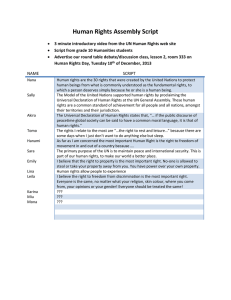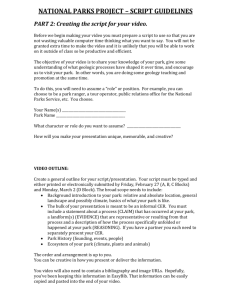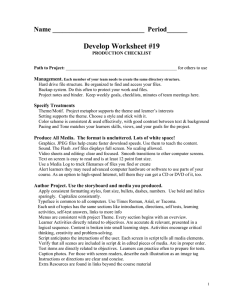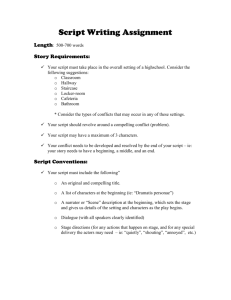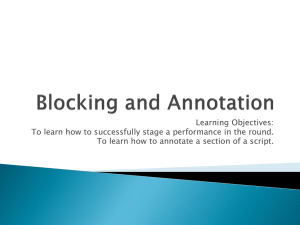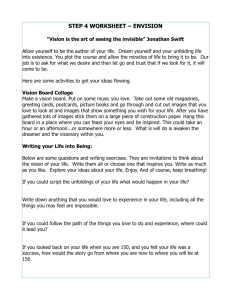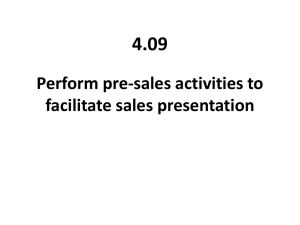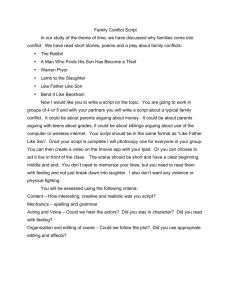The Compiled Script: An Inspirational Experience?
advertisement
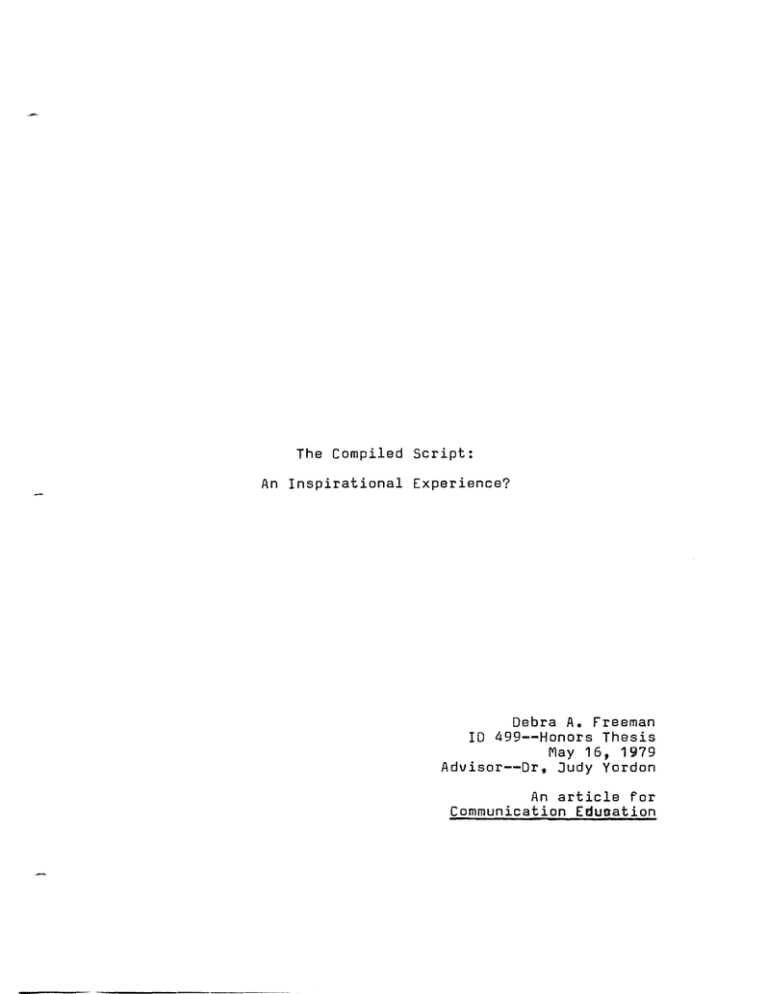
The Compiled Script:
An Inspirational Experience?
Debra A. Freeman
ID 499--Honors Thesis
May 16, 1979
Advisor--Dr. Judy Vordon
An article for
Communication Eduaation
~ ,) J{
,"I
As anyone who has ever tried to adapt a Readers Theatre
script knows "to compose is not an inspirational experience."'
The task of composition becomes easier if one has a workable
format which he or she may use as a guideline.
Most important-
ly, one neeos to remember that in any Readers Theatre script
the adapter should always "feature the text."
Readers Theatre scripts can be categorized into at least
three general groups:
a single work script that has been adap-
ted to perfcrmance length (Paradise Lost--Milton); a multiple
work program which features the literature of a particular author (tlAn Evening with Robert Frost"), a particular genre ("Sonnets by contemporary Female Writers"), or particular idea (t'Love-a Collection of Readings by Frost, Dickinson, and Shakespeare");
and the compiled or distilled script that utilizes literature
from all genres and many different authors unified by a theme.
The first two types of programs mentioned, the single and multiple work scripts, have been discussed in several aritcles and
textbooks:
but comparatively less has been written about the
compiled script.
It is this writer's intent, therefore, to con-
centrate on this particular type of Readers Theatre script in
order to point out its advantages and disadvantages, discuss
the necessity of deciding on a director's concept or purpose,
offer ideas on picking a theme, suggest sources from which to
gather materials, and propose some feasible methods of structure
----------------_
.............
_
....
_-
.(
2
and composition.
It is hoped that this article will provide a
springboard for those who may attempt a compiled script.
Why should one do a compiled script rather than a single
or multiple work script?
The answer is manifold.
First, the
compiled script cannot only be performed by students, but can
also be put together by students.
This "co-authorship" can have
a very beneficial effect on the highly motivated student as well
as on the less motivated one.
The highly motivated can find a
new directicn in which to channel his or her energies, and the
less motivated can gain a sense of accomplishment and involvement
with the
literatur~
the script.
knowing that he or she helped in completing
Second, the compiled script, being an accumulation
of various kinds of literature, is a compact way of exposing students to many genres, many authors, many writing styles, and eventually many performance techniques.
The third and probably most
important advantage of the compiled script is that it provides
an effective outlet for creative energy.
of many students can be stimulated
thro~h
The creative potential
finding the litera-
ture, writing original material, selecting a theme, putting the
script together, and performing the product of their efforts.
While there are many advantages in doing a compiled script,
there are some drawbacks, too.
A compiled script requires as much
if not more time spent on organization and structure of materials
as any other group performance of literature.
can make or break the success of a script.
The organization
As Beverly Whitaker
Long, Lee Hudson, and Phillis Rienstra Jeffrey say in their book,
Group Performance of Literature,
3
At its best, the compiled script is a
er'eative synthesis of different but related literature; at its worst, it is
unfocused and fragmented. 3
Not only is building a compiled script time consuming, it
also requires a large amount of decision-making concerning purpose, theme, and structure of the script as well as finding suitable materials to use in the compilation.
If one has the time
and the resources are available, the advantages of attempting
a compiled script far outweigh the disadvantages.
The initial decision that must be made by the director/adapter deals with the overall concept or purpose he or she has
in mind.
Does he or she want to be persuasive or entertaining
or both?
Does he or she want to confront the audience, influ-
ence it to think about or act upon a specific problem ("stop
Nuclear Power")?
Or does he or she wish to accomodate the spec-
tators by giving them an entertaining, l'sit-back-and-relax" kind
of evening?
It is not impossible, however, to persuade and en-
tertain at the same time as one might do in an after dinner speech.
The decision of being "rhetorical" or "poetic" will depend, of
course, upon the context and occasion of the presentation of
the script.
The director/adapter should carefully consider the
place where the performance will occur, the audience who will
be watching, and the circumstances surrounding the performance
when deciding upon his purpose.
These factors will also be
important in choosing a workable theme.
For example, one might
4
choose a persuasive line of reasoning for a performance to be
done for a meeting of the local labor union and an entertaining
program for the city band boosters
picnic.
One of the most difficult steps in creating a compiled script
is the determination of a workable and sufficiently limited theme.
The director/adapter usually begins with a broad topic area such
as "crime."
In order to narrow the theme, he or she should de-
cide on a specific area to explore:
1)
How many kinds of crime exist and what are they?
2)
How does crime affect children?
3)
From what environment does crime begin?
Adults?
The elderly?
Why?
How?
WhEn?
4)
Whet personality types become criminals?
Why?
5)
How do rural crime rates stack-up against urban statistics?
6)
Is crime always bad?
Can it be good?
7)
Do criminals get their just punishment or does only the
victim suffer?
8)
How is crime treated in and by the media?
All of these questions can transform the broad topic, "crime;"
into a specific, limited, and workable theme for a compiled script.
Finding suitable literary material is the next step in creating a
com~iled
script.
This job can be done solely by the
director/adapter or can be a class project with various students
searching for acceptable pieces.
Following is a list of several
sources that may direct one to or provide workable material.
(This writer realizes the importance of choosing works of lit-
5
erary merit, but also believes that students may be motivated
~
furthe:£, by incorporating some pieces that might not be thought
quite as meritorious.)
1)
Library Sources
Short Story Index
Poetry Index
Poetry Anthologies
Short Story Anthologies
PBriodical Guide
Dictionaries
Encyclopedias
A:.manacs
NE~wspapers
Excerpts from Novels
Radio Scripts
Television Scripts
Plays
U.mericks
Haikus
Textbooks
2)
Jingles
3)
Joke Books
4)
Original Material (especially from students)
A good methcd of collecting material is to initially gather as
much as can be found and then decide what will be used and what
will be discarded.
add extra.
It is always easier to cut out
than
6
Once the director/adapter has established an appropriate
theme and found sufficient material, he or she must then decide
how to treat that theme and material structurally.
At least two
basic types oe compiled scripts exist, and these types can be
categorized into two general groupings:
1)
the presentation
of several aspects of an idea experienced through various attitudinal voices (several readers take on different attitudes related to the exploration of the theme and mayor
go a change in character) and 2)
may not under-
the presentation of material
organized causally which uses characters that remain consistent
throughout the script (readers perform specific roles and most
undergo some sort of change).
After determining the basic structure of the script, the
adapter must then "decorate li his framework.
sition of the script is the next step.
easier task if one has rules to follow.
The specific compo-
Composition becomes an
Louis B. Horst and Car-
roll Russell, in their book Modern Dance Forms, suggest several
structural patterns for composition. 4 Although the book is written for dancers, its suggestions can be easily applied to building a compiled script.
One possible form of composition is the Sonata form followin9 an ABA pattern.
With this form, the adapter begins with the
original theme (crime is detrimental to society), presents a
contrasting aspect of this theme (in spite of its detrimental
effects, crime serves as a boost to the United States' economy),
and then returns to the original theme in a somewhat different
aspect (generally, crime is detrimental to society).
The B sec-
7
tion of this form is not quite as important nor takes as much
time as the A section but should be provided for the sake of
variety and manipulation of the theme.
the ABA form with life itself:
to the unknown." 5
Horst and Russell equate
"we are born, we live, we return
The ABA pattern can be expanded to include
other manipulations of the main theme--ABCA or ABCBA or ABCAB.
The C is often a transitional idea.
The more parts that are
added, the more complex and, hopefully, more interesting the
script becomes.
Theme and variation is another possible method of composing
a compiled script.
Theme and variation allows more freedom than
the ABA form as there is no need to return to the specifics of
the first theme aspect that is stated.
The same theme is kept
throughout, but any number of variations may be presented.
Again,
using the general topic of "crime," one might choose tiThe effects
of crime" as his theme.
Variations on that theme might include:
1)
How does crime affect the elderly?
2)
How does crime affect the poor?
3)
How does crime affect the wealthy?
4)
How does crime affect the children?
There are many variations on any given theme the adapter might
choose.
A .completely different pattern the adapter might choose is
the Rondo--ABACADAEAFA etc.
Different variations and manipulations
can be perfcrmed through the 8,C,D,E, and F parts,but they are
always tied together by the A or central theme.
the Rondo pattern would be organized as follows:
An example using
8
A--Crime doesn't pay!
8--J8ss3 James was one of the most famous men in American
history, but he died in disgrace.
A--Crime doesn't pay!
C--The
~afia
is one of the wealthiest organizations in the
United states, but it also has a very high fatality rate.
A--Crime doesn't pay!
D--David 8erkowitz received an immeasurable amount of press
coverage, but now he is in an insane asylum.
A--Crime doesn't pay!
One of the most difficult things to accomplish in a compiled
script is moving from one piece of literature to another without making any particular piece seem more important than another.
This can be accomplished through the use of unifying or transitional
elements.
For instance, a narrator or a repeated phrase may be
used to tie the script together.
Using a narrator brings added
focus to main ideas and provides transitions from one idea to
another.
A repeated phrase, as in the previous example concern-
ing "crime," also can provide smooth transitions.
Other transi-
tional elements can be discovered within-the literature itself
or from brainstorming activities.
Only basic ideas and suggestions concerning advantages, purpose, theme selection, sources of material, and methods of structure have been presented here.
Perhaps the suggestions have pro-
vided some alternatives to composition by "inspirition" alone.
The compiled script can be an exciting, challenging, and rewarding way of producing a successful Readers Theatre.
Hopefully,
9
the ideas and suggestions offered will be of some value for those
who wish to try a compiled script.
The writer also has the de-
sire that this article will provide stimulation for other thoughts
and ideas on the compiled script.
Notes
1 Louis B. Horst and Carroll Russell, Modern Dance Forms
(San Francisco:
Impulse Publications, 1961), p. 23.
2 For further information concerning single and multiple
work scripts, see Alan W. Benson. "The Drama Director and Readers Theatre:
Blessing or Curse?"
The Speech Teacher, 17 (Novem-
ber, 1968), 328-330; Keith Brooks and John E. Bielenberg. IIReaders Theatre as defined by New York Critics," Southern Speech Jour~,
29 (Summer Issue, 1964), 228-302; Leslie Irene Coger. "Theatre
for Oral Interpreters," The Speech Teacher, 12 (November, 1963),
322-330; Joanna Hawkins Maclay, Readers Theatre:
of Practice (New York:
Toward a Grammar
Random House, 1971), pp. 7-11.
3Beverly Whitaker Long, Lee Hudson, and Phillis R. Jeffrey,
Group Performance of Literature (New Jersey:
1971), p. 25.
4 Horst and Russell, pp. 23-27.
5
Horst and Russell, p. 24.
Prentice Hall, Inc.,
Bibliography
Horst, Louis B. and Carroll Russell.
Francisco:
Modern Oance Forms.
San
Impulse Publications, 1961.
Long, Beverly Whitaker, Lee Hudson, and Phillis Rienstra Jeffrey.
Group Performance of Literature.
Hall, Inc., 1971.
New Jersey:
Prentice
